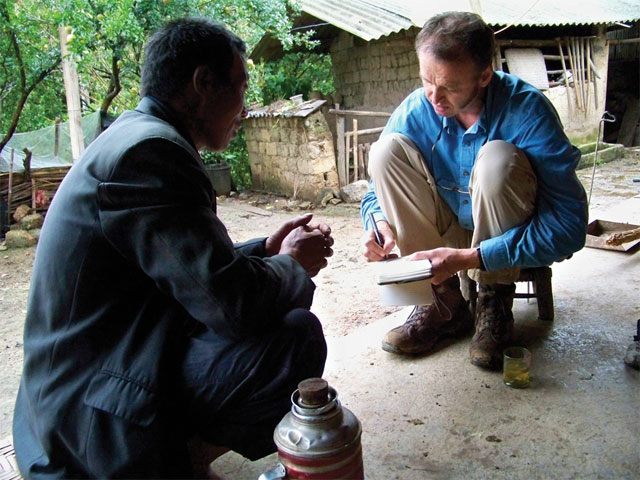
Joshua Muldavin, Ph.D.
B.S. (Conservation and Natural Resources), M.A., Ph.D. (Geography), University of California, Berkeley.
Dr. Joshua Muldavin has a long and distinguished record as a researcher and teacher concerning his interests in globalization, China, Japan, and Asia, policy analysis, rural development, international aid, agriculture and food, climate change, political economy, and political ecology.
His current research projects analyze international environmental policy and impacts on local resource use and vulnerability in China and the Himalayan Region (with his long-time collaborator Piers Blaikie); aid to China since 1978; climate change policy; socialist transition's environmental and social impacts in China; alternative agriculture; and global resource and development conflicts via capital flows from East Asia to Africa, Latin America, and South/Southeast Asia.
He has completed thirty years of field research, primarily in rural China,  as well as in Japan, Nepal, India, Russia, Hungary, northern Europe, Cuba, and Mexico. During this time he has been a consultant for various Chinese government ministries and international organizations, coordinating numerous development projects and feasibility studies on agriculture, agro-industry, grassland reclamation, environment, micro-finance, and rural development.
as well as in Japan, Nepal, India, Russia, Hungary, northern Europe, Cuba, and Mexico. During this time he has been a consultant for various Chinese government ministries and international organizations, coordinating numerous development projects and feasibility studies on agriculture, agro-industry, grassland reclamation, environment, micro-finance, and rural development.
He is the recipient of grants, fellowships, and awards from the National Science Foundation, Social Science Research Council, Luce Foundation, Ford Foundation, MacArthur Foundation, Institute on Global Conflict and Cooperation, and Fulbright among others. He has been an invited lecturer at Princeton, Yale, Oxford, Johns Hopkins, the U.S. Congressional Commission, and European Parliament. His research contributions in Geography have appeared in Economic Geography, Geopolitics, Environment and Planning A, Geoforum, and the Annals of the Association of American Geographers.
He was Chair and Director of International Development Studies at UCLA from 1994-2001. He was a Resident Research Fellow with the East West Center's Program on Environment in 2003, Visiting Scientist at the International Center for Integrated Mountain Research and Development (ICIMOD) in Kathmandu from 2006-2008, Visiting Professor at China Agricultural University from 2007-2008, Visiting Scholar at Sophia University in Tokyo 2006-2010, and is currently a Visiting Scholar at the China Academy of Social Sciences in Beijing, as well as the Executive Director of the Action 2030 Institute, a small policy think tank. He was invited to be an Expert Resource Person and Facilitator at the Asia-Europe Peoples Forum in Beijing in 2008, and at the World Social Forum in Brazil in 2009. He co-organized the first Sustainable Food and Agriculture Workshop and Film Festival in Beijing in March 2010. He serves as a policy expert and core member of the Japan Foundation and Social Science Research Council's initiative on environment and climate change in Asia.
While at UCLA he won the Distinguished Teaching Award, and was also given the Eby Award as the best teacher of the year. He is a frequent contributor to international news reporting on China and Asia, including for the BBC, International Herald Tribune, South China Morning Post, Boston Globe, Los Angeles Times, New York Times, and the Wall Street Journal. At the annual meetings of the AAG in Washington, D.C., he was given the Award for Media Achievement of the Association of American Geographers for 2010 for his long-term efforts to bridge the gap between academic research and public awareness on key contemporary global issues. He is currently Professor of Geography at Sarah Lawrence College.
